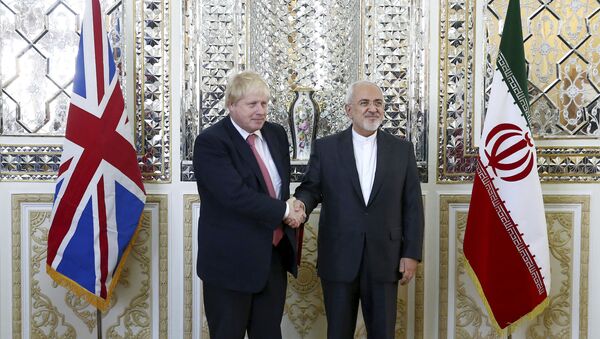The Iranian ambassador to the United Kingdom, Hamid Baeidinejad, welcomed a new approach by London toward the possible release of Nazanin Zaghari-Ratcliffe, speaking in an interview with Iranian Etemad newspaper.
According to Baeidinejad, the previous British foreign secretary, Jeremy Hunt, had a different approach to the Zaghari-Ratcliffe issue, but UK Prime Minister Boris Johnson’s new government was seeking to alter its stance.
"We think that, with the complete failure of former British Foreign Minister Jeremy Hunt's policy of conducting this case only to the point of increasing tension, we are recently seeing a change in the attitude of the new British government with hope that this policy will be sustained and resolved. The British and western governments must realize that the policy of pressure on our country has no effect," Baeidinejad pointed out.
The Iranian envoy also stressed that the the judiciary will have the final say.
“As we know, classes of prisoners who spend half their time in prison can be subject to reduced sentences. We have tried to advise Ms Zaghari’s family to think of trying to use such legal and judicial remedies in Iranian law, rather than taking psychological measures and designing political and media campaigns on Iran. We have repeatedly urged the British government to refrain from politicising the case, and instead of abusive actions such as granting ‘diplomatic protection’ to Zaghari – which would only further politicise the situation – to pursue the issue through legal and judicial channels”, Baeidinejad suggested.
According to the UK Foreign Office, Iran does not recognize dual nationality, which limits the UK's capacity to provide consular support to a dual national in the event of detention.
UK's $500Mln Debt to Iran
Besides, Baeidinejad revealed that authorities of Iran and the UK are in talks regarding a multibillion debt owed by the United Kingdom to the Islamic republic, and looking at novel ways to get the debt paid.
The United Kingdom owes Iran roughly 400 billion pounds ($490 mln) for Chieftain tanks, which it sold to Tehran in the last century but never delivered.
"The legal process of this long-running case, which has been going on for more than 50 years, is nearing its end. The court has ordered the British government to pay the Iranian debt plus interest, and this cannot be changed. At the same time, the opposing lawyers have tried to use every legal opportunity to delay the practical execution of the court’s decision", Baeidinejad said.
According to British authorities, London cannot pay the Iranian Ministry of Defence the cash because the Iranian military and Iran’s central bank remain sanctioned by the European Union and the United States.
“It is natural to come up with ideas for the type of payment as the time comes to pay off the debt, given the complexities and banking problems. The Islamic Republic of Iran also has ideas for expediting the debt. Finalising the payment method requires a mutual agreement, and talks are underway to determine the details of how the agreements will be implemented”, Baeidinejad detailed.
According to the Guardian, it is the first time a British or Iranian official has admitted in public that talks on the matter are underway.
Neither Tehran nor London have openly acknowledged any link between the legacy debt and the detention of British-Iranian dual national Nazanin Zaghari-Ratcliffe.
In September 2019, former UK Foreign Secretary Jeremy Hunt noted that the repayment of debt could not be considered a bargaining chip in talks on the release of Zaghari-Ratcliffe.


